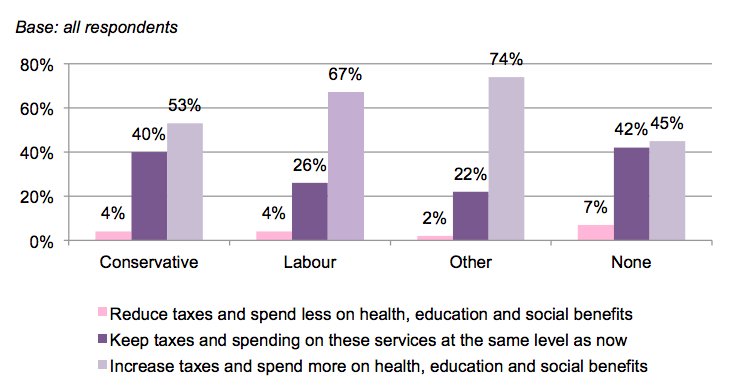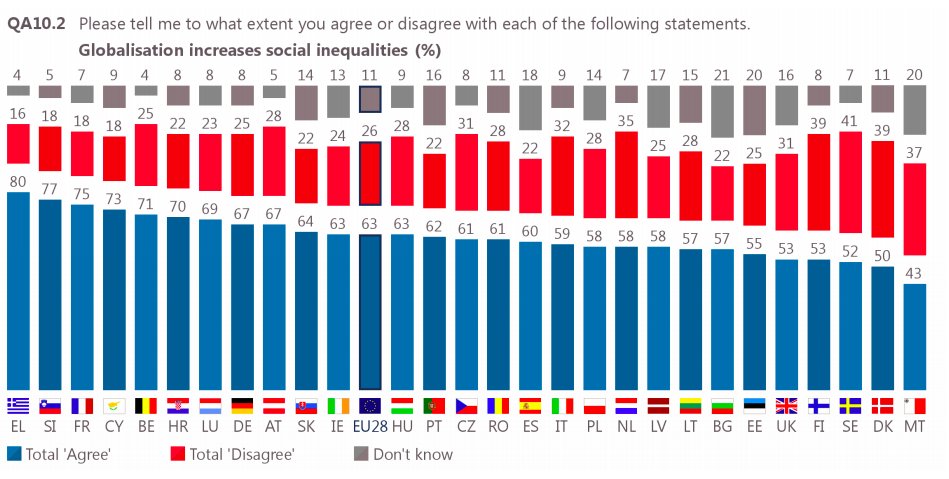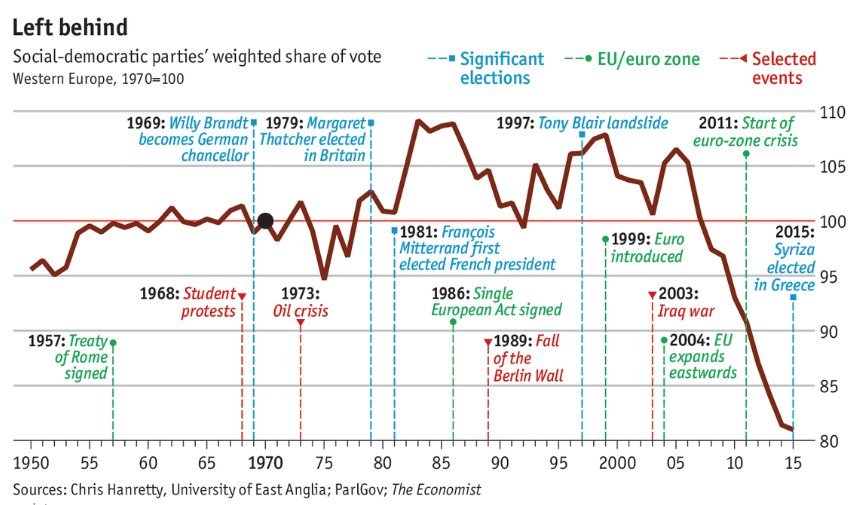I get a lot more calls about Corbyn than I do about Brexit
Britain is about to transition from a debate about 'Brexinomics' to a debate about 'Corbynomics'
Lots of people in the City are already having that debate
Britain is about to transition from a debate about 'Brexinomics' to a debate about 'Corbynomics'
Lots of people in the City are already having that debate
And usually the same question comes up - what do ordinary people think about Corbyn's policies?
The first thing to say is that the broader 'macro' environment in Britain --how people think about the economy- has changed in a number of important ways
Consider tax and spend. British voters are today are far more supportive of raising taxes in order to invest more in public services than they used to be
Here's how Brits have thought about taxation and public spending between 1983 and 2017
Source: National Centre for Social Research
Source: National Centre for Social Research

In 2017, support for increasing taxes to spend more on health, education and social benefits reached its highest level (60%) since 2002
Whereas the % who want to retain the existing levels of tax and spend (33%) is at its lowest level since 2002
Two-thirds of Labour supporters (67%) want to increase taxes and spend more
But, crucially, and for the first time in 15 years, most Tories (53%) say the same
But, crucially, and for the first time in 15 years, most Tories (53%) say the same
This is how those views break down by party affiliation
Conservatives should note that while many ex-UKIP voters agree with them on cultural issues like Brexit & immigration they are often more instinctively on board with more tax + more spend. Not Thatcherites on steroids
Conservatives should note that while many ex-UKIP voters agree with them on cultural issues like Brexit & immigration they are often more instinctively on board with more tax + more spend. Not Thatcherites on steroids

In the words of NatCen: "For the Conservatives these figures may raise concerns that the public is tiring of an austerity programme that has been a centrepiece of their time in office"
Furthermore: "These figures suggest that advocates of tax cuts have some way to go to convince the public of their position, particularly if those tax cuts are associated with a lack of growth in health and education spending".
Last year, YouGov painted a similar picture
The vast majority of Brits (65%) said "I'd rather the government spends more on public services even if it means higher tax" versus only 18% who said "I'd rather pay less tax even it means less spend on public services"
The vast majority of Brits (65%) said "I'd rather the government spends more on public services even if it means higher tax" versus only 18% who said "I'd rather pay less tax even it means less spend on public services"
Moving on, other recent work has shown how many voters instinctively lean towards Corbynomics when it comes to things like ....
Curbing senior executive pay
voicing scepticism about the relentless pursuit of profit
doing more to regulate businesses
and putting workers on company boards
Source: Legatum
voicing scepticism about the relentless pursuit of profit
doing more to regulate businesses
and putting workers on company boards
Source: Legatum

This same report probed what people associated with 'capitalism' (left) and 'socialism' (right) and then put the responses into representative clouds 👇👇👇 



Unsurprisingly, polling this week suggests that Labour's proposal to put workers on boards has gone down rather well 

Some of the other key planks of Corbynomics are also popular
Consider the nationalisation of rail and utilities (as well as other industries)
Support is pretty widespread
Support is pretty widespread

% of Conservative & Labour voters who back nationalisation of:
Royal Mail (Con 53%, Lab 78%)
Rail (Con 43%, Lab 78%)
Energy (Con 36%, Lab 66%)
Water (Con 42%, Lab 74%)
Bus firms (Con 35%, Lab 64%)
Royal Mail (Con 53%, Lab 78%)
Rail (Con 43%, Lab 78%)
Energy (Con 36%, Lab 66%)
Water (Con 42%, Lab 74%)
Bus firms (Con 35%, Lab 64%)
In a different study last year, voters asked to choose between:
'Utilities (water, gas, electric) provide best service when run by competing private firms'
vs
'Utilities provide best service when run by nationalised companies owned by the government'
'Utilities (water, gas, electric) provide best service when run by competing private firms'
vs
'Utilities provide best service when run by nationalised companies owned by the government'
Among all Brits, 45% said "best service when run by government" versus 29% who said "best service when run by private companies"
Only Tories split evenly (40-39), while clear pluralities in every other group backed nationalisation
Only Tories split evenly (40-39), while clear pluralities in every other group backed nationalisation
We can also look at this from another angle
Has private companies running public services 'gone too far/much too far'?
Has private companies running public services 'gone too far/much too far'?
It's also clear that some of the more 'populist' elements of Corbynomics have widespread sympathy
Consider some unique polling on this by YouGov only a couple of years ago, at the time when Corbyn was coming to power in Labour
'The poor get poorer and the rich get richer in capitalist economies'
64% of all Brits agree (29% agree strongly)
64% of all Brits agree (29% agree strongly)
'Free enterprise is better at lifting people out of poverty than government'
Only 39% agree with this statement
Only 39% agree with this statement
'Most of the biggest businesses in the world have dodged taxes, damaged the environment or bought special favours from politicians'
74% agree
74% agree
'What is good for business is usually good for the rest of society'
Only 29% agree
Only 29% agree
'Government should tax or limit cheap consumer goods from abroad that cause unemployment in our own manufacturing industries'
Only 22% disagree
Only 22% disagree
And it is no secret that all of this is wrapped up with an intense pessimism about the future direction of the current economic and social settlement
'The next generation will probably be richer, safer and healthier than the last'
Only 19% agree
Only 19% agree
It is also clear that people are generally willing to sacrifice a bit of GDP it it means that the end result is a fairer society
Last year, British voters asked to choose between:
1) I'd prefer wealth to be spread more equally even if it means the economy grows more slowly
2) I'd prefer the economy to grow faster even if it means slightly more inequality
1) I'd prefer wealth to be spread more equally even if it means the economy grows more slowly
2) I'd prefer the economy to grow faster even if it means slightly more inequality
68% opted for slower economy + greater equality
(So did 64% of Leavers and 54% of Tories by the way)
(So did 64% of Leavers and 54% of Tories by the way)
That latter point raises another for the Conservative Party
By hoovering up a lot of UKIP/working-class voters in 2017 your electorate is today a little more economically protectionist/interventionist than in earlier years -- they want changes to the economic settlement
By hoovering up a lot of UKIP/working-class voters in 2017 your electorate is today a little more economically protectionist/interventionist than in earlier years -- they want changes to the economic settlement
It is also pretty clear that quite a few people are not really convinced that competition in the private sector is actually making Britain a better place to live
If you give voters the statements:
1) Private competition increases living standards for the majority bc it creates jobs and keeps prices down
vs
2) Private competition reduces living standards bc it mainly helps the rich, leads to poverty wages and shoddy services'
1) Private competition increases living standards for the majority bc it creates jobs and keeps prices down
vs
2) Private competition reduces living standards bc it mainly helps the rich, leads to poverty wages and shoddy services'
38% say they are closer to statement 2, 35% to statement 1
Only Conservative voters are more likely to back the first by a break of 54-27
Only Conservative voters are more likely to back the first by a break of 54-27
And we can also pan out and look at the wider landscape to see how none of this is really unique to Britain
I'd argue that across much of Europe today there's clear evidence of a pretty widespread, instinctive scepticism toward the effects of free markets and globalization, all of which taps into this agenda
Across the EU area only 54% readily say they think positively about globalization. Not exactly a ringing endorsement
In Britain, 46% hold negative views or are unsure whether this is good or bad
In Britain, 46% hold negative views or are unsure whether this is good or bad

While most Brits agree that global markets are an opportunity for economic growth, a not insignificant 37% either reject that idea or do not know either way
They are noticeably less likely than some of their northern European neighbours to think it is an opportunity
They are noticeably less likely than some of their northern European neighbours to think it is an opportunity

And while 57% of Brits think globalisation 'represents a good opportunity for British companies thanks to the opening-up of markets', again a not insignificant 43% either reject this outright or do not really know either way 

Corbyn and McDonnell also clearly have an audience when drawing a straight line from global markets and capitalism to the issue of inequality
Majorities in Britain and almost every EU state agree that 'globalization increases social inequalities'
Majorities in Britain and almost every EU state agree that 'globalization increases social inequalities'

Corbyn obviously has challenges, not least the fact that more voters (32%) continue to back the Conservative Party on the economy than Labour (19%)
Though, intriguingly, almost half of the population do not back either
Though, intriguingly, almost half of the population do not back either
Corbyn is also partly constrained by fact that "identity-security nexus" (Brexit, migration & crime) remains highly salient & Tories lead on these
But the idea that "Corbynomics" does not have resonance/widespread appeal is wide of the mark - he has a receptive audience
End/
But the idea that "Corbynomics" does not have resonance/widespread appeal is wide of the mark - he has a receptive audience
End/
• • •
Missing some Tweet in this thread? You can try to
force a refresh













